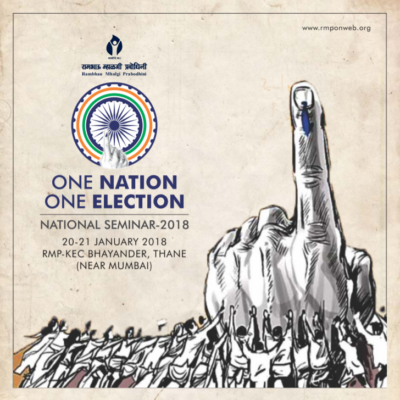The nation has been paying a heavy price for this seemingly inevitable multiplicity of elections. It starts with a long, arduous code of conduct, which is ethically correct; but practically problematic. In the name of election code, the entire government machinery almost gets an official license to stop working or at least stop completing the undergoing work. Election code has become more of a stumbling block than a true code of administrative impartiality ending every kind of favoritism. Second, the idea of good governance habitually takes a beating every time elections are round the corner. Governance involves larger good of the people and not just earning popularity. But, when elections are around, rulers are scared to take even simple regulatory mechanism related decisions as the lurking fear of people going against them tops their thought process. As a consequence, postponing unpopular decisions has set in as a practice and we all eventually have to pay its price. Third, when elections are near, populist demands are pushed by various groups as they know that at least for now, the government may not dare to say ‘no’. All this has promoted both, competitive populism and a tendency to indulge in competitive compromises with good governance. Fourth, the financial cost of conducting elections independently is also so huge that a nation like India doesn’t afford the same in any way. The fifth point is about multiplicity of electoral mechanisms as well. From electoral rolls to distribution of booths and polling stations, either there is needless differentiation or duplication and that causes both, needless expenditure and wanton creation of confusion. One Nation, One Election has the potential of taking care of many such issues, undoubtedly!
Multiplicity of elections also impacts upon the quality of mandate. Public memory is always short; but repeated elections being a contest between almost the same competitors is also likely to lure them to switch their preferences within a relatively shorter span of time. This amounts to creating an atmosphere of uncertainty and political instability as well.
The idea is widely being discussed today in various academic circles and expert groups after Prime Minister Narendra Modi informally floated this in year 2016 in an all-party meeting held prior to the budget session. Shri. Modi who himself is a strong votary of the concept has thereafter raised it again for wider debates and discussions at various forums. Pitching in the case for simultaneous elections he had said that ‘Elections are held all the time and continuous polls lead to a lot of expenditure. Huge number of government employees including a large number of teachers are involved in the electoral process causing maximum harm to the education sector. Security forces too have to be diverted for the electoral work leaving the borders precarious’.
The Standing Committee on Personnel, Public Grievances, Law and Justice under chairperson, Dr. E. M. Sudarsana Natchiappan, in its report submitted on December 17, 2015 on ‘The feasibility of holding simultaneous elections to the House of People (Lok Sabha) and state legislative assemblies‘ also favoured the One Nation, One Election idea. Citing the reasons for its recommendation, the report had mentioned that ONOE would reduce: (i) the massive expenditure that is currently incurred for the conduct of separate elections; (ii) the policy paralysis that results from the imposition of the model code of conduct during election time; (iii) impact on delivery of essential services and (iv) burden on crucial manpower that is deployed during election time.
The idea further got reassertion from the former President, Shri. Pranab Mukherjee during his Republic Day speech when he mentioned that “The time is also ripe for a constructive debate on electoral reforms and a return to the practice of the early decades after independence when elections to the Lok Sabha and state assemblies were held simultaneously. It is for the Election Commission to take this exercise forward in consultation with political parties”.
Way ahead
Exploring the possibility of conducting simultaneous elections remains a difficult yet probable solution to all the problematic issues, which are the direct outcome of multiplicity of elections. Prime Minister, Narendra Modi, among others is a strong votary of One Nation, One Election.
He has appealed political scientists, researchers, politicians, election administrators as well as people at large to discuss the idea of simultaneous elections and deliberate on various issues concerning its practicality and implementation mechanism. Rambhau Mhalgi Prabodhini organised this national conclave on ONOE on this setting. We invited political scientists, researchers, students, persons who are associated with election management, political party representatives as well as citizens to contribute in this churning of ideas.


